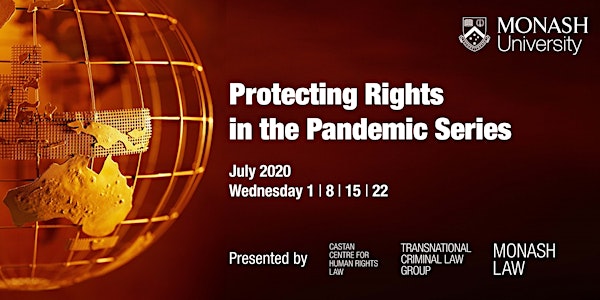
Protecting Rights in the Pandemic Seminar Series
Protecting Rights in the Pandemic Series runs once a week for four weeks
Date and time
Location
Online
About this event
For the protection of the life and health of the community from COVID-19, governments have introduced unprecedented controls over many aspects of the everyday lives of virtually all people. Never before in peacetime have so many measures interfered with human rights in such fundamental ways. At a time when serious questions are being raised about their impact upon the most vulnerable, this seminar series will critically examine the application of and justification for the measures from a human rights and criminal law perspective.
Considering the position of charged offenders and prisoners, temporary migrants and people exercising the right to protest, the speakers will ask important questions about the scope and nature of the control measures and how they can be reconciling with the rule of law. The adequacy of existing legislative mechanisms for ensuring human rights protection and also governmental accountability will be questioned.
Session 1: Bail, Sentencing and Prisoners under COVID-19
Wednesday 1 July 2020 | 5.30pm - 6.30pm
In March 2020, the World Health Organisation declared the 2019 novel coronavirus (COVID-19) a pandemic because of the severity of the disease, and how rapidly it has spread across the world. This declaration had significant repercussions internationally and domestically. Governments around the world proceeded to implement a number of restrictions in an attempt to ‘flatten the curve’; a concept aimed at limiting the spread of the virus.
The imposition of these restrictions has had a substantial effect on the criminal justice system in general, and for prisoners and prisons management in particular. In this seminar, Dr Natalia Antolak-Saper will consider the issue of COVID-19 in the context of decisions relating to remand – bail and sentencing; where the issue of the virus has been most pronounced. This will be followed by a presentation by Professors Lorana Bartels and Thalia Anthony who will discuss the challenges and lessons for prisons management from COVID-19.
Speakers
- Dr Natalia Antolak-Saper, Transnational Criminal Law Group, Monash Law
- Professor Lorana Bartels, Criminology Program Leader, ANU Centre for Social Research and Methods
- Professor Thalia Anthony, Faculty of Law, University of Technology Sydney
Moderator
- Professor the Hon. Kevin Bell AM QC, Director of the Castan Centre for Human Rights Law, Monash Law
Session 2: Temporary Migrants as a Vulnerable Group under COVID-19
Wednesday 8 July 2020 | 5.30pm - 6.30pm
This session focuses on the human rights of migrants. The pandemic has left many groups of migrants in particularly precarious positions. Temporary migrant workers who have lost their livelihoods have been largely excluded from the federal government’s support package and are exposed to a number of economic and health risks. Migrants held in immigration detention are particularly vulnerable to further harms due to detention conditions and their existing exclusion from systems of assistance. This session examines these issues in light of Australia’s international human rights obligations.
Speakers
- Associate Professor Heli Askola, Monash Law
- David Manne, Refugee Legal
Moderator
- Professor Liz Campbell, Francine V McNiff Chair of Criminal Jurisprudence, Monash Law
Session 3: Protest and Policing under COVID-19
Wednesday 15 July 2020 | 5.30pm - 6.30pm
This session will examine the way in which the COVID-19 laws have been implemented in practice and will focus on two particularly concerning issues: the impact upon the right of persons to protest and the breadth of discretion given to police in enforcing the COVID-19 directives.
The COVID-19 laws present particular challenges to human rights due to the amount of discretion they give to police officers – allowing police to hand out significant fines and arrest people simply for being out in public. A key problem is that the COVID-19 laws often use open-ended and vague terms to describe offences and sanctions.
This seminar will examine the serious implications this may have for key human rights such as freedom of movement, freedom of expression and freedom of assembly.
Speakers
- Dr Maria O'Sullivan, Castan Centre for Human Rights Law, Monash Law
- Professor Liz Campbell, Francine V McNiff Chair of Criminal Jurisprudence, Monash Law
- Dr Faith Gordon, Lecturer in Criminology, School of Social Sciences, Faculty of Arts, Monash University
Moderator
- Dr Natalia Antolak-Saper, Transnational Criminal Law Group, Monash Law
Session 4: Legislation, Governance and Accountability under COVID-19
Wednesday 22 July 2020 | 5.30pm - 6.30pm
The stay-at-home, no-work and other measures were introduced under COVID-19 through statutory directives that (in most jurisdictions) did not require public, certified human rights clearance. Changes to the operation of judicial systems were introduced by legislation that (in Victoria, the ACT and Queensland) did require that clearance, but did the legislation go too far? This session examines the adequacy of our systems for democratic oversight of the COVID-19 measures and how they might be reformed.
Speakers
- Professor the Hon. Kevin Bell AM QC, Director of the Castan Centre for Human Rights Law, Monash Law
- Professor Felicity Gerry QC, International Queen's Counsel, London and Melbourne, Professor of Legal Practice
Moderator
- Dr Maria O’Sullivan, Castan Centre for Human Rights Law, Monash Law
Contact us
Name: Janice Hugo
E-Mail: janice.hugo@monash.edu
Phone: 03 9905 3327
Organised by
The Castan Centre is a world-renowned academic centre using its human rights expertise to create a more just world where human rights are respected and protected, allowing people to pursue their lives in freedom and with dignity. The Centre’s innovative approach to public engagement and passion for human rights are redefining how an academic institution can create important and lasting change. The Centre is named after the late Ron Castan AM QC, a passionate advocate of human rights.